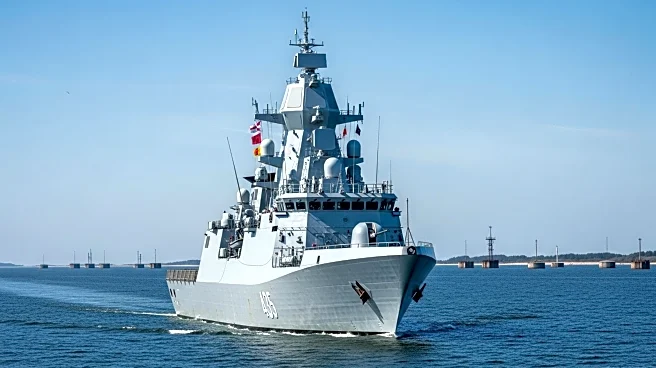What is the story about?
What's Happening?
NATO is enhancing its 'Baltic Sentry' maritime presence to address the emerging threat posed by unmanned aircraft systems (UAS) in the Baltic region, particularly affecting Denmark. This initiative follows recent incidents where Danish airports were forced to close due to UAS activity. The German Navy's frigate FGS Hamburg has been deployed to provide air-defense capabilities as part of NATO's enhanced vigilance activity (EVA). Commander Arlo Abrahamson, MARCOM chief spokesperson, emphasized the alliance's commitment to increased surveillance and deterrence in the region, utilizing multidomain assets including intelligence, surveillance, and reconnaissance platforms.
Why It's Important?
The expansion of NATO's maritime presence in the Baltic region underscores the alliance's adaptability in addressing new security challenges. The deployment aims to reassure member states and deter potential threats from UAS, which have disrupted airspace operations in Denmark. This move is significant for regional security, as it strengthens NATO's deterrence capabilities and demonstrates its commitment to protecting member states from emerging technological threats. The initiative may also influence future defense strategies and collaborations within the alliance, enhancing overall security in the Baltic Sea region.
What's Next?
NATO's continued vigilance in the Baltic region is expected to involve further deployment of assets and increased collaboration among member states to counter UAS threats. The alliance may explore additional technological solutions and partnerships to enhance its surveillance and deterrence capabilities. Stakeholders, including political leaders and defense agencies, are likely to monitor the situation closely, potentially leading to policy adjustments and increased investment in defense technologies.
Beyond the Headlines
The deployment of NATO assets in response to UAS threats highlights the growing importance of addressing technological advancements in warfare. This situation raises ethical and legal questions regarding the use of unmanned systems and the need for international regulations to manage their impact on civilian infrastructure and airspace security.
















